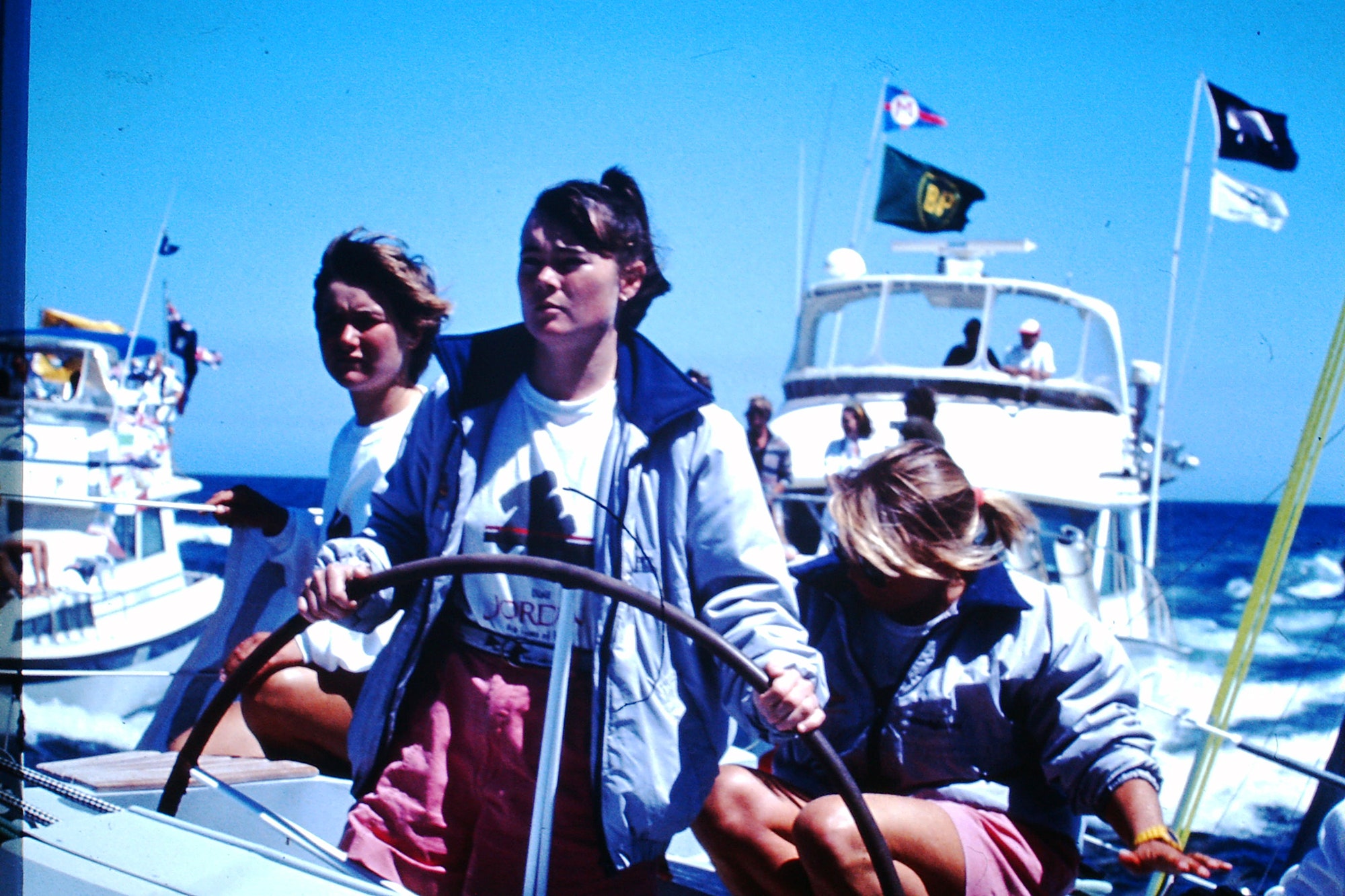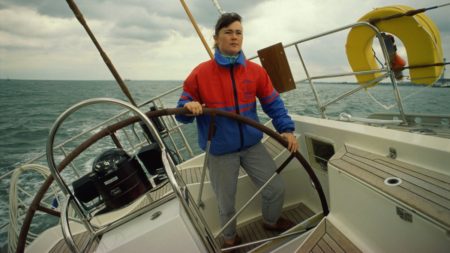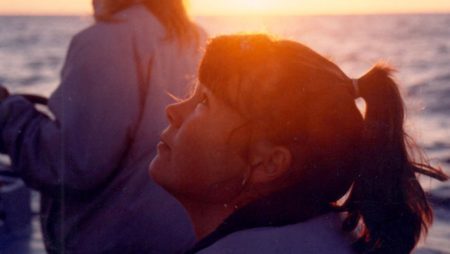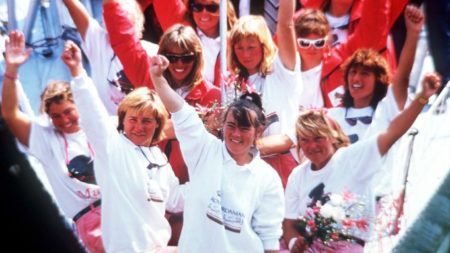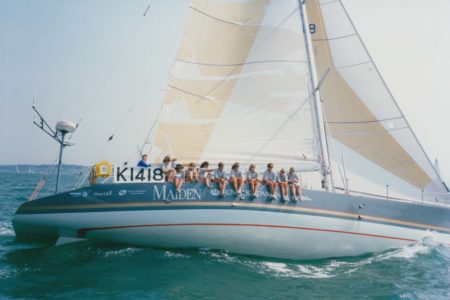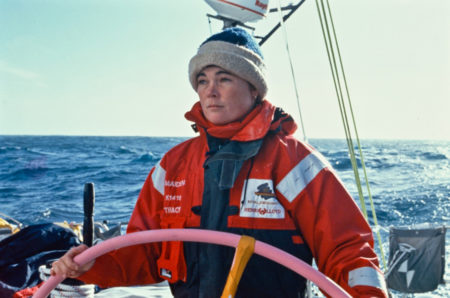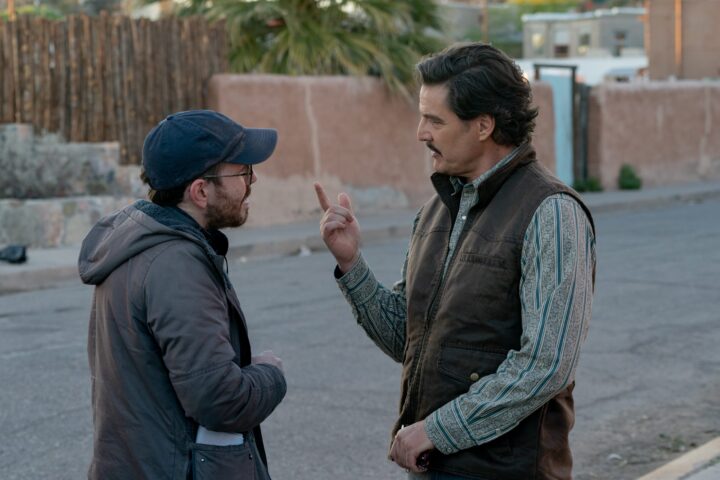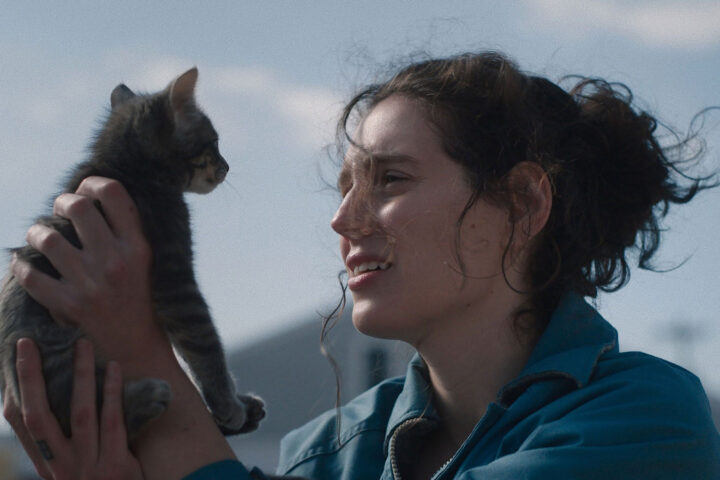She was always going to do exactly what she wanted.
At 15, British youth Tracy Edwards unceremoniously left an unhappy Wales home to start a new life in the Greek port of Piraeus, quickly finding work as a stewardess on a yacht cruising the Aegean. Never mind that she had no prior sailing experience—this serendipitous vocation would quickly cement a lifelong passion with far-reaching consequences, both personal and cultural.
While what happened next may have become a celebrated chapter of sports history, it also became the stuff of feminist lore: how an unlikely, aimless yet spunky teen, in just a few short years, became the skipper of the first all-female crew to compete—quite successfully—in 1989’s famed Whitbred Round the World Yacht Race, which, she was told at the time, was no place for a woman. Thankfully, she didn’t believe it.
Initially without sponsorship and working around the clock to rehab a worse-for-wear yacht she would ultimately name Maiden, on which the women would cross 33,000 often treacherous miles over nine months at sea, Edwards—a driven, gregarious force whose life has been one of meaningful coincidences, highs, lows and boundary crossings both geographical and symbolic—didn’t know that her personal victory would equal liberty for underdogs everywhere and a coup against the patriarchy in sports and society at large. Ultimately, navigating 50-foot waves on the high seas didn’t prove as difficult as facing a relentless tsunami of populist skepticism, much of it perpetuated by sexist male journalists certain the crew lacked the right stuff to go the distance.
I recently caught up with the indomitable Tracy Edwards to chat about the new documentary Maiden, as exciting and affecting as any narrative movie this year in recounting their extraordinary circumstances and journey, thrilling reassembled through an excavation of onboard video footage, as well as time-capsule news clips and new interviews with the women who made it happen—and the men who were sure it wouldn’t. Hers has been a life well-traveled, a sailing legend turned motivational speaker and international advocate for young women’s education, and so much more.
Your passion for sailing found you, didn’t it? You didn’t go looking for it.
Yes. There’s not any part of my life that’s been planned, really. Although Maiden definitely was, getting there was sort of a torturous route and there were lots of things I found out about myself that I did not know.
The film is quite a raw account of your route.
It’s very raw! And watching it is very weird. All of us have agreed that while watching it we are saying, ‘That’s not me!’ For me, looking at the person that is being interviewed, I can’t believe how together she is and how sensible and saying some quite profound things. I remember myself as being a bit of an idiot, twit and a loudmouth!
In the film, you say that you’ve always done exactly what you wanted to do.
That’s always been true, yes. The film has been quite interesting because it’s changed how I remember Maiden. I remember everything in a certain way and I misremembered some bits. So the documentary has made me very proud of what we achieved—and that has taken a long time. I am English, Roman Catholic and female, so I spend a lot of time apologizing for everything in that sort of, ‘Oh, no, it was nothing!’ What the film has enabled all of us to do is say, ‘Thank you so much. I am very proud of what we achieved.’
It must be amazing today to see the footage assembled as such, and essentially take the trip again.
It’s extraordinary! It took (director Alex Holmes) two years to find that stuff; it wasn’t just sitting on a shelf somewhere. I had just done a talk at his daughter’s school and he approached me and said, ‘Has anyone made a film about it?’ I said, ‘No, they haven’t actually.’ And he said, ‘Oh my God, I’m a film director.’ He is a documentary filmmaker, which is his first love. And he started talking to me about things like scripts. And I said, ‘You do know we filmed all this, don’t you?’ He said, ‘Where is it?’ And I said, ‘No idea. Everywhere!’ So we started with my mum’s news footage, because she recorded everything. She once said to me, ‘Someday you’ll be happy that I did this.’ And boy, were we ever.
Early in the film you say this was something you had to do. Why was that, despite having never been in a competition like this before?
When I did the 1985-1986 race I’d just been invited onto some- you’ve got these loads of charter boats all doing the seasons in different places and moving around, and I got in with a group of people who would then race on the weekends. So I started doing a little bit of that and found it fun, and discovered that I was also quite competitive, which I did not know about myself.
Fun? Those 50-foot waves of the South Ocean? That’s not fun, right? Maybe it is!
Oh, it is! I mean it’s terrifying as well, but it’s fun. So the 1985-1986 race was, for me, to see if I enjoyed sailing around the world. I had to go as a cook because I couldn’t have done anything else. Maiden really was born out of me wanting to navigate, which is my passion, an around the world race. And I knew I would never be allowed to. So if the world looked like that, and did not suit me, I knew I needed to change it into a world that did suit me. And that is why I put Maiden together—quite a selfish reason to start off with, but then with the reaction that we got, I was just like, ‘Okay, there is something else altogether going on here.’ And I knew that I had to do it. It wasn’t just about me being a navigator. I had to change everything. So that is what we started tackling.
And you were quite young when this started.
I was twenty-three, and then twenty-six when we started.
You must have had an innate leadership quality to source all those remarkably talented women to be part of the crew and then identify their individual strengths and then get the absolute best out of them nine months. Did you have any idea what the leadership dynamic would be like?
No, and I really was making it up as I went along. I’d love to say it was all planned! I didn’t know how to pick a team. Things happened to me that I then embraced. When we started putting the project together, people just arrived! Literally, random strangers would appear on my doorstep and say, ‘How can I help? What you are doing is incredible.’ So some people would stuff envelopes and lick stamps and send out sponsorship opportunities. Some would sell boxes of badges and balloons at boat shows to raise funds to keep us going. And then bit by bit, female sailors showed up. We did have formal CVs sent in and we would go through them and interview—although interview is probably overstating it—but we were very lucky that it took us so long to get the money to put the project together because these women came on as part of it. They weren’t just taken on as crew.
Every other team had a project and then they employed crew. We were the project. We would choose someone to be on the crew and then say, ‘You’re going to have to go get a job because we can’t pay you anything and you’re going to have to work on the boat during the day.’ A lot of the girls had bar jobs in the evening and would work on the boat during the day. How we got any sleep I don’t know! And then when we got sponsorship, we finally could pay people, but by that time it had been a great way of finding out the caliber of people. And that was a job. I am so lucky to have taken that time because I suddenly ended up with this extraordinary group of people who had been tested every step of the way.
Your relationships were already cemented.
Yes. So when other boats crossed the start line, they were like, ‘I just joined this boat and we have our smart crew uniforms and are getting paid a load of money,’ and off they went. But when we got to the start line we were like, ‘We have fought every inch of the way to get here and now we are doing what we want to do.’
Do you ever think about the serendipitous nature of all this and the seemingly random encounters you had that led you to all of this? For example, you were offered the job as the stewardess on the yacht and then you just happened to coincidentally meet King Hussein…
I know! (laughs)
So if those two things hadn’t happened- maybe you’d have done this anyway through some other route, but isn’t it amazing how one thing led to the other in this seemingly coincidental way?
Yes. That is my life. But then, my mum always said, ‘If you open yourself up to the universe, you will always meet the right people at the right time.’ And honest to God, I always shave. I’ve always turned around and there has been someone that I need to have in my life at that moment. When I met King Hussein, I didn’t know that I was ever going to go on to do anything. He was just a lovely, fascinating man and a collector of people. And I was in his collection. Ham radio operators, hang gliders, sailors—he loved humans, and that is why Jordan is the only stable country in the Middle East now, because he wanted equality in gender and religion and ethnicity and culture and education. He was such a visionary, and even way before he put in the funds, he was in the background saying, ‘Don’t give up. You can do it. Don’t forget what I told you.’ The final result, then, was to ask him for the money because I really, really, really wanted to do it without his help. I wanted that sponsor. But in the end, I knew that we had to get to the start line and that was the way that we were going to do it. So this amazing man said, ‘What took you so long? I knew you had to take your time, but I’ve been waiting for you to ask me.’
At what point did you as a team realize that you were doing something historically and culturally significant beyond just participating in the race?
Probably at halfway around the world. After we watched the film Dawn (Riley), ‘I know we were all there for our own reasons, but isn’t this collective that we ended up in amazing?’ And I think that’s right. We were all doing it for our own reasons, but we came together as team and that reason then became, ‘Oh, okay, this is bigger than us. It’s about all women everywhere. No, it’s actually about people everywhere being told they can’t do something and having to fight to be allowed to do it.’
For me, the moment I realized that this was going to be more than just Maiden, and it would go on and on in my life, was when we came into New Zealand and had won the second leg and we still had people going, ‘It’s just luck.’ And I was like, ‘What do we have to do to get taken seriously?’ And that’s when we realized that it was so important for us to get it right and to keep going, because every woman that came after us would be tarred with the same brush as us. And then it became a whole different issue, and an important one. When we finished, I don’t think we were under any illusions that we had changed the world or even sailing, but that we had put a hole in that wall, and we laid the groundwork for others to come after us.
You did may other things in your life after this. You studied and got a degree in psychology at age forty-seven, for example. It seems to me that you continue to grow and evolve and jump into things with the same sort of passion you did during your initial races. Is that your DNA?
I think it is, yes. My favorite quote is Charles Darwin’s ‘It’s not the strongest or most intelligent species that survive but those most adaptable to change.’ I am a bit like that.
You’ve had a lot of changes in your life. Highs and lows.
Yes, I had a lot of changes. But I think our children will also. They will have twenty jobs in their lifetimes and some of those haven’t even been invented yet. My daughter is going to have a job that doesn’t exist at the moment. And I think if you do have that ability- I’m very good at rolling with the punches. I do get set on a course, but if something knocks me, I recover quite quickly. I don’t think you can teach that. But for me there has been a natural progression in a way, because Maiden let me and the first all-female crew to attempt the nonstop around the world record, which led me to Maiden II, which was the first mixed gender team ever and that was only twenty years ago—my God—and has never been done again! So while the Volvo (Ocean Race) is encouraging women, we are still not quite there. So there always seems to be something else to do!
You’re a motivational speaker also, right?
Yes!
What lens do you put on this? Is it about vision and determination and leadership?
I don’t know if I really speak about leadership because I think I’m a bit of an accidental leader. But what I do feel very strongly about is that you can’t moan about things unless you’ve tried to change them. Do something about it. If your world doesn’t look the way you want it to, change it! And you only have the right to complain about it if you’ve done everything you possibly can to change it. So I think it’s that sense of being a main player in your own life. You are the lead role, and you have to get stuck in and get on with it. That is the main message.
At that time and your age, it seems that you were an unlikely person to do this.
Yes, very.
But you saw it and you did it. Why do you think more people don’t do something like this?
I was lucky enough to have great mentors and people around me encouraging me and some people don’t have that. And much of what I want to say to girls is that there is no such thing as a perfect route to success. It’s messy and you have to get down in it and get your hands dirty. I think there is an unrealistic expectation on all young people today, but girls especially, and that is perfection: look right, sound right, do the right things, wear the right things, be the right way. And life isn’t like that. You have to find your way through it.
Your mother is an important voice in the movie as is your relationship. There’s one moment where she says she always knew you could do this if you just stuck to it. What is it like for you to see yourselves together onscreen like that?
Yes. It’s interesting because when I left home, I hated my mum because she hadn’t realized what was happening to me. But then I hadn’t told her; I was a closed book and hated asking for help. I think that is something I am still working on. So when I left home, I left home. I left my family and just forgot all about them. It was really the 1985-1986 race that rekindled our relationship and made me remember what an extraordinary woman she was. (Tearing up) Sorry! And how she really was the foundation of everything I do in my life as the person she encouraged me to be. I was on the Atlantic Privateer in the 1985-1986 race, and she just came with me! She came to the stopovers. I was going out with one of the guys from Drum, and a guy from (its crew) said, ‘Oh, Pat, come and live with us and you can be our mum!’ So I saw her through a whole different light, and it reminded me who she really was, which was an extraordinary woman. And then when she came around with us, with Maiden, just the joy of watching her joy was amazing and it really brought us together again, so strongly.
What do you want to do in life that you’ve not yet done?
Oh, God. I think I need to continue doing what I’m doing which is fighting for women’s rights and girls’ education. We are doing that with Maiden, now—we’ve rescued her and she’s sailing around the world. Raising money and awareness for girls’ education is my absolute passion. I threw away my education. I live in a country that gives me an education, and at the age of 15 I said, ‘Nah! I don’t need that. Thank you very much!’ There are currently 130,000,000 girls around the world that don’t have an education because they are not allowed to, for whatever reason. That is a low estimate. There are many millions more. So I think what I need to continue doing is changing the world, and I have done some of that at a grassroots, girls’ education level. That is important.
